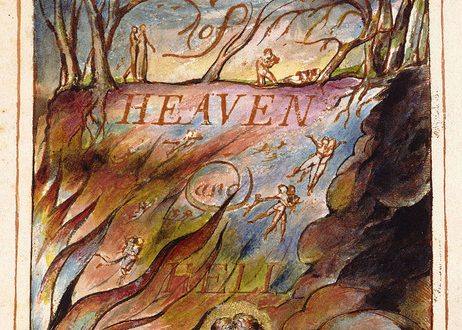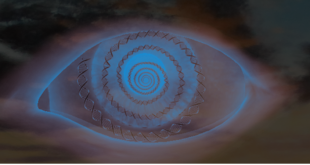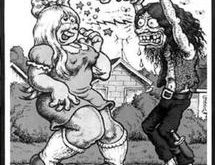Cover Image: William Blake
Everything about the setting and the people at the ceremony was reassuring. I had been resisting invitations for years, partly because I didn’t like the idea of taking a powerful psychoactive substance in a group setting. I was afraid that I might be lying next to some highly neurotic person whose energy would be spilling out into my space. But everyone there seemed to be a centered, grounded, humble spiritual warrior of some sort, there to be purified.
It was dusk, the sky an almost cobalt blue mottled with clouds. The grassy fields and mountains in the distance were still saturated with color, though the sun was already below the horizon. There was a hushed feeling in the landscape, waiting for night to fall, just as we were waiting for dark to imbibe the powerful medicine.
As the effects of the ayahuasca came on, winds began to sweep across the surrounding fields. The wooden structure enclosing us had a canvas roof, and as gusts of wind blew against the rafters, there was a sense of being in a Native American lodge or tepee. Throughout the night, I felt the primeval bond of a tribe undergoing a collective dark night of the soul comforted by intimate solidarity.
At first, I felt the bitter medicine heating up my brain, and then it traveled down into my core. I lay on my side at times, as our guide instructed us, to keep the nausea down, and I was able to retain the medicine without purging.
It started to create visuals—somewhat DMT-like, but none drew me in or seemed to have any particular content. They appeared to be fractalizing phosphines and more like test patterns projected by a brain gone haywire than visionary content.
There were frightening moments where I felt the medicine physically pressing on me, pushing me inward and against the floor, and this was extremely disturbing because it so closely resembled what people who have survived heart attacks have described–this feeling of a building on top of their chest. This fed into fears about my health and aging, which were a charged context going into the experience.
My consciousness was battered in a feverish vortex, spinning me inward. I was being pressed and compressed into my core, like the eons of pressure on carbon needed to form a diamond. I found myself claustrophobically pinned into a core of suffering, my awareness overwhelmed by the pain of neurological chaos and an agonizing sense of the suffering of some of my most significant others.
Again and again, I thought of what my mother experienced in the last days of her life after she had a massive left-hemisphere stroke and was still sentient but could no longer communicate with words. I wondered if this was what it was like to be isolated in a corner of a dying brain. I felt the agony of what it would be like to get beaten to death, to be in a place of physical agony while a damaged or dying brain didn’t give you any quiet corner within yourself to reflect on what was happening to you.
And yet, I was able to reflect. I was in a state of grace in that my consciousness wasn’t just being obliterated, wasn’t just a nucleus of uncomprehending suffering, but still had a spiritual and psychological understanding and empathy. I had no safe observational distance from anything, no more than someone bleeding out in a smoldering mass of sheet metal and broken glass by the side of the freeway, but my cognitive abilities were still present. But the death-spiral feeling of neurological chaos brought me to an edge where I could feel what it would be like to have to endure agony without such grace. I felt the panic and chaos my brother-in-law must have felt when he was struck with a fatal heart attack. That feeling of being an above-ground creature who has just had the bottom of the universe collapse beneath your feet, and all that remains is a few moments of white-hot panic in a state of chaotic agony before you are enveloped by the abyss. The suffering of particular significant others seared into me–the unknown last days of a young friend who committed suicide. There was a potent sense that those moments of agony they felt were eternal so that it was as if they were still caught in them, still caught in death agony, and perhaps the compassion I felt for them could still reach out to them across time.
There were moments when the medicine flashed a kind of multi-dimensional glyph or pictogram that was audible, visual, and animated. There was a word I heard, perhaps in a Spanish dialect, that I couldn’t retain, but it presented an image of a knife slicing through a skull–it was a representation of the death blow and of the chaos of panic and agony that so many sentient beings have had to undergo, and that might come to them in violent and humiliating circumstances, their dignity and consciousness ruptured by it. There was a sense that this multi-sensory glyph was a familiar motif of the medicine woven repetitively into its tapestry.
I saw the crucifixion as an appropriate metaphor for not just the human condition but the condition of all sentient beings. I also recognized Buddhist themes- all being as sorrow and the need for compassion for all sentient beings.
I felt some elements of grace that enabled me to comprehend what was happening to me. I remembered the advice to surrender and not to fight the experience or try to stay in control, but that I could try sitting up if it got too intense.
I was still capable of reason and in control of my body and movements when I needed to be—while other more agonizing and less grace-filled medicines I have taken in the past obliterated those capabilities (see: Shred to Black—Salvia Blue Moon Apocalypse). On a couple of occasions, I could stand up and walk outside to seek out a bathroom.
As the screen door closed behind me, I stepped out into Vincent Van Gogh’s Starry Night. Everything was primordial, potently alive and aglow with the swirling colors of the cosmos. The manmade things seemed as primal and beautiful as the natural. There was a feeling of brotherhood and comfort in seeing the staggering forms of a few others who had also walked out into the moonlit field. Even from their shadowy silhouettes, I could see that they were as mesmerized and overwhelmed by what they were experiencing as I was.
Curled up in fetal positions on my sleeping mat, I felt my soul agonizingly reawakened to the primal, irreducible need for compassion in all circumstances. I saw my life and the lives of my parents and significant others were based on compassion, but that I was often disassociated from empathy, just as they often were, even if many of the things we did were based on it. There were so many moments of suffering for myself and others where, in the eclipsed confusion of our pain, we hurt ourselves and each other.
I felt the spiritual agony of people who had done terrible things–serial killers, the Columbine kids turning the guns on themselves, Hitler in his bunker biting into a cyanide capsule in case the gunshot to his head went awry. I felt directed to have compassion for beings who obliterated others and had to endure timeless bardos of agony. I felt it was essential to have compassion for their suffering as well as for their victims. I felt a universal brotherhood with all sentient beings who suffer and that nothing could ever be more important than compassion for those who suffer.
Note added 9/25/16 : Someone on Facebook asked me if Donald Trump came to mind during the experience. I responded: Actually, both he and Clinton did appear in my mind, and were seen in a compassionate context. Hillary seemed to be suffering physically, emotionally, psychologically, and spiritually from the unrelenting tension of her role. Trump seemed joyfully confused and thought of himself as having good intentions and doing the right thing. He possessed the childish confidence of a boy who assumes without question that he is the universe’s favorite.
I felt a will to survive the rite and be permanently changed by it. I wanted another chance to relate to people with empathy–the spiritual and emotional intelligence so often eclipsed in me. I live so much of my life in a state of disassociation from compassion, pressed by desires, frustrations, and irritations at the intrusion of the world and other people’s pain and confusion. I wanted to come back and have compassion for the pain of others that led them to do confused, messy things that created more pain for themselves and others, including me.
Before I took the medicine, I thought the sounds of other people purging and struggling would be distractions, and I brought two sets of noise-canceling headphones. But during the experience, I never considered using them. The sounds of other people struggling were a backdrop of solidarity and even comfort as I realized I was part of a brotherhood of sentient entities who suffered and felt compassion for the suffering of others.
The songs and energy of the helpers welcomed me into that primordial brotherhood of those who felt devoted to compassion for sentient beings. A grace of the experience was that unlike so many who suffered through agonies in a state of terrifying isolation, there was no boundary of alienation because the whole group and every part of the ceremony were awakening me to the realization that my realizations were universal, that there was nothing unique or ego-inflating about what I was feeling, I was merely being welcomed to rejoin a timeless primordial brotherhood of those who allowed suffering to break open their hearts and feel compassion for all beings who suffer . . .
***
And then, of course, I returned to a subtly altered version of my baseline consciousness. The baseline from which I will check to see how many likes what I just wrote will get on Facebook. The baseline from which I will continue to work out of states of partial disassociation, some of them quite necessary, as an overpowering sense of the world’s suffering would be a detriment to the performance of many tasks and proper conduct in my casual transactions with people.
And that’s OK because I must live in both the spiritual/archetypal and mundane domains.
And as with all such potent medicine experiences, people vary in their ability to integrate them. Some were such seasoned psychonauts that they were coming back for another round the next day, while I need a break of years before I can summon the courage to look into the sort of abyss that Nietzsche said would hold your gaze and look back into you. The value in these experiences is not in their quantity, not about having more notches in your ayahuasca belt than someone else, but in how much you can integrate the confrontation with darkness and light.
A shaken person at the breakfast circle said the experience confronted him with how unenlightened he was. I told him that from my shadow-integration perspective, realizing that you are not enlightened is the most reliable form of enlightenment. The way to integrate enlightenment is to recognize that it is something you may touch but don’t own and that it’s more important to treat others as if you were enlightened, a stance you have to earn moment by moment.
Part of the strangeness and uncanny privilege of taking ayahuasca and certain other medicines is that you can gaze down the long barrel of a gun into the godhead of evil, darkness, agony, and death and a few hours later be eating fruit salad and muffins in a sunny field, sitting in a circle of folding chairs, sharing notes with other people who have also just emerged from the inferno with scarcely a hair out of place. For a few hours, you might have felt like a helpless infant tied to railroad tracks, your soft tissues pierced by broken glass and razor blades as you bled out beneath a merciless sun, but then you can have a very pleasant breakfast and realize that you actually got to experience agonizing enlightenment and devastating epiphany at a highly discounted price.
A friend of mine at the breakfast circle shared that he was told during the experience to say certain things to particular people that, now that he wasn’t stoned, he knew there was absolutely no way he was going to say. He was told, for example, to go up to someone who had profoundly wronged him and say, “If you ever feel hurt, come to me.” I shared that I was told such to say such things too, and that I also wasn’t going to say them in the mundane life. I did say them, but within the experience. They were things the other person wouldn’t be in a space to hear (unless perhaps they were also stoned on ayahuasca). I told him that such suggestions were probably meant to be more metaphorical than literal and meant to be said within, not without. The ceremony leader agreed that one needed to keep the grounding to recognize the difference between the reality of the medicine experience and what would work in the mundane world.
Everyone in the circle had something profound to say, but I was annoyed at people who kept referring to the medicine as “grandmother” or the “divine mother.” Now that I was a few hours from being humbled into near oblivion, my confrontational assertiveness couldn’t resist pushing back. I told the group that turning a cocktail of plant-derived chemicals into an omniscient deity was probably a mistake. My hunch is that the guiding intelligence that sometimes appears in the experience is the result of human beings, over eons of use, building a morphic field around the medicine so that it lived in the collective unconscious as an archetype. That may seem like a semantic difference, but I don’t care for the sentimental inflation of plants or fungi. The most healing experience I ever had with a medicine was a dose of big-pharma-made MDMA in the early 80s when the substance had just come out and still had a clean morphic field. Later, its field became corrupted and depotentiated by its abuse as a rave and party drug taken in awful settings and with superficial intentions. This is all speculative, of course, but that’s my intuition. Plants are awesome and cosmic, but my gnostic perspective and Ockham’s Razor suggest that the guiding intelligence derives more from inner depths–the collective human consciousness, rather than a goddess posing as a tropical vine. I credit the wonderful people who created a transcendent ritual with primordial cultural roots more than the brew of organic compounds. But wherever it comes from, I’m grateful for the agonizing enlightenment and the fragile potential to integrate it into my life.
See also my interview with a friend who, unlike me, had the nerve to go for the second dose and had a much more spectacular experience: Andrew’s Ayahuasca Experience.
See also my effort to push the language pedal to the metal to describe my most devastating and bizarre medicine experience: Shred to Black—Salvia Blue Moon Apocalypse
 ZapOracle.com home to the free 720-card Zap Oracle
ZapOracle.com home to the free 720-card Zap Oracle






